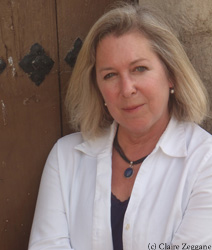Join a community of readers who are committed to Jewish stories
Sign up for JBC’s Nu Reads, a curated selection of Jewish books delivered straight to your door!
Earlier this week, Doreen Carvajal wrote about trying to recover her family’s secret identity. She will be blogging here all week for Jewish Book Council and MyJewishLearning.
 Most everyone has a family tree. But how do you turn a dry chart of birth and death dates into something more vibrant that can be shared for generations? Turn into a reporter. And then preserve the story in a compelling way.
Most everyone has a family tree. But how do you turn a dry chart of birth and death dates into something more vibrant that can be shared for generations? Turn into a reporter. And then preserve the story in a compelling way.
By writing about my own family mystery with my first book, The Forgetting River, I wanted to share the story of the secret Sephardic Jewish identity of the Catholic Carvajals in a way that could introduce ancestors to descendants.
I’m a journalist by trade, but I made many mistakes along my own journey to explore my family. A basic lesson I learned was to start early to interview relatives about personal family history. By the time I began to probe our past, key relatives with vital information had died.
But one of the most crucial mistakes I made was that I lost my own journalistic skepticism when I questioned family members about delicate subjects. I didn’t gather much information when I asked directly if we were the descendants of Marranos, forced Christian converts who maintained a dual identity to escape persecution during the Spanish Inquisition. To probe sensitive family history, I realized belatedly that it’s best to work from the edges. Think. Watch. Observe. I asked benign questions and searched for records that allowed information to seep out about customs, household rituals, job patterns, prayers. I found that the older generation sometimes confided more in their grandchildren and nieces than their own children. From this strategy, I learned about a hidden menorah kept in a bedroom dresser or fourth cousins marrying fourth cousins, an almost tribal habit of trusted secret Marrano families intermarrying and maintaining the appearance of being Catholics.
Lately, I’ve been thinking about other strategies that families can exploit to start conversations and unlock memories. An acquaintance organized a family reunion for a large black family on the East Coast with some painful history dating back to slavery. Some relatives were reluctant to remember those times, but they settled on the idea of creating a griot cookbook, asking relatives for family recipes along with submissions of personal memories evoked by the dishes. The griot is a reference to a traditional West African storyteller.
Once conversations start flowing, seize the opportunity. Make a recording. The StoryCorps is a non-profit organization that offers advice about preserving personal history, down to suggested conversation openers (What is your earliest memory? What are the most important lessons you’ve learned in life?).
Visit Doreen Carvajal’s official website here.